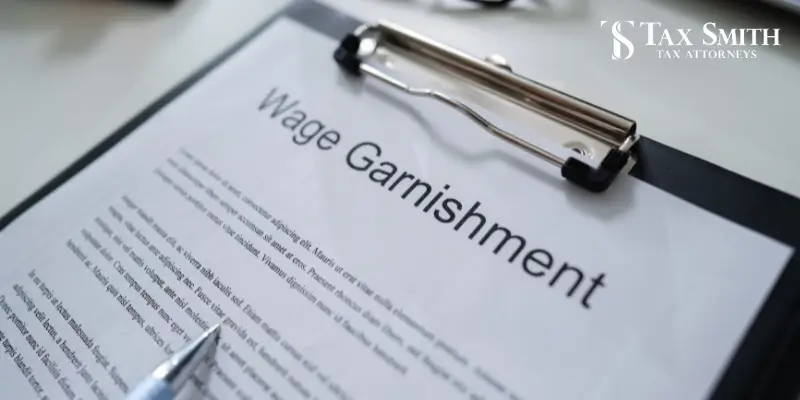1548 The Greens Way – Ste. 4 Jacksonville Beach FL 32250
Tampa Wage Garnishment Lawyer
Tampa Wage Garnishment Attorney
If your wages are garnished, it can prevent you from paying bills and meeting your basic living expenses. Wage garnishment by a state or federal tax agency can be stressful, but there may be options to resolve it and free up your finances. A knowledgeable Tampa wage garnishment lawyer can find options to reduce or prevent wage garnishment and other collection actions.
The IRS (Internal Revenue Service) does not typically begin collection actions with wage garnishment. It will first send you a notice of your tax debt. If attempts to inform or contact you are unsuccessful, then the IRS may take a percentage directly from your paycheck to pay your debt. This is especially straining when you rely on the entirety of each paycheck to make ends meet. Fortunately, an experienced Tampa IRS Tax attorney can address all your financial situation.

Work With Tax Smith Tax Attorneys
At Tax Smith Tax Attorneys, we have worked in tax laws for decades, including helping many individual and business taxpayers handle IRS collection actions. Our team understands the significant consequences that wage garnishment can have on your life, so we can strive to find solutions to your situation.
Being unable to pay your tax debt can be incredibly frustrating, but you have options. We could help settle your tax debt, limit its financial consequences on your life, and mitigate additional financial hardship.
What Is Wage Garnishment?
If you have a significant debt with the IRS or state agency, and the agency’s steps to contact or negotiate with you have been ignored, the agency can notify your employer of the debt. Your employer is required to remove a percentage of your paycheck and send it directly to the tax agency. Most creditors must go through the court to garnish your wages, but the IRS does not have to. Wage garnishment in Florida can have serious financial consequences, but knowing your rights and options can help you address the issue effectively.
Wage garnishment can affect you whether you earn hourly wages or a salary. It can also affect your commission, bonuses, and other forms of income. If you receive government benefits, wage garnishments could also affect this income, although differently than other income. If you are self-employed, your accounts receivable could be garnished.
The IRS may also take steps in addition to wage garnishment, depending on your tax debt situation. It may put tax liens on your property or other assets, and it could levy your bank accounts.
How Can You Address Wage Garnishment?
The most immediate way to address and resolve wage garnishment is to pay back your tax debt in full. Once the IRS receives and processes the payment, the wage garnishment should end in a certain period of time.
However, if your wages have been garnished, it is likely because you were not financially able to pay back your tax debt earlier. There may be other options to limit the collection actions against you, such as:
- Negotiating the amount that is being garnished: Your tax debt attorney can negotiate with the IRS or state agency to limit how much is removed from your paycheck, enabling you to cover your expenses.
- Applying for the head of household exemption: If you provide significant support for a dependent, you can file for status as the head of household. In Florida, this allows you to avoid the garnishment of your wages or requires that you first agree to any garnishment.
- Resolving your tax debt: There may be other, more effective ways to resolve your tax debt, including a payment plan or an offer in compromise. You could also qualify for penalty abatement. An attorney can help you determine the right way to resolve your debt.
- Filing for bankruptcy: Certain types of bankruptcy can end wage garnishment. However, this method should only be considered in extreme cases.
Your unique financial and personal circumstances will influence what options you have to resolve wage garnishment and your tax debt. An attorney can review your options and help you make an informed choice. Knowing when to hire a tax attorney can make a significant difference in resolving complex tax issues like wage garnishment.

FAQs About Tampa, FL Wage Garnishment Law
How Do I Fight Wage Garnishment in Florida?
The most immediate way to fight wage garnishment in Tampa, FL is to pay back the entirety of your tax debt to the relevant state or federal agency. If this is not a financial possibility, there may be options to negotiate the amount of your tax debt or arrange a payment plan. If the garnishment of your wages is more than the amount the creditor is allowed to take, or it is violating other laws, you can fight this garnishment by filing against the creditor. Understanding wage garnishment limits can help you determine how much of your paycheck may be affected by IRS collection actions.
How Do You Negotiate Wage Garnishment?
You could negotiate wage garnishment for unpaid taxes. If possible, you should prioritize paying your tax debt. However, if you cannot cover your expenses, there may be other options. An experienced tax attorney can negotiate with the IRS or state tax agency for you. You might secure a lower wage garnishment or another option for settling your debt. An attorney could help you reduce your debt or get more time to pay it back.
What Income Cannot Be Garnished in Florida?
If you qualify for the head of household exemption in Florida, some or all of your income cannot be garnished. You are the head of the household if you are providing more than half the support for a child or another dependent in your home. If your disposable income is over $750 each week, you must agree to wage garnishment. If your income is under that amount, you are exempt from wage garnishment. However, you have to file for the exemption quickly.
What Is the Most They Can Garnish From Your Paycheck?
The most that the majority of creditors can garnish from your paycheck is either 25% of your income or 30 times the current U.S. minimum wage, whichever is lower. However, this limitation does not apply to state and federal agencies trying to recover state or federal tax debt. Debts for either tax agency could result in wage garnishment, and the IRS does not need court approval to garnish your wages. An attorney can explain what limitations may apply to the garnishment of your wages.
Preventing IRS Collection Actions in Tampa
If you are having your wages garnished or anticipating IRS collection actions for unpaid taxes, it is crucial that you do not ignore this situation. A seasoned tax lawyer can outline what you can do to mitigate or prevent these collection actions if paying back the debt is not an option. Contact Tax Smith Tax Attorneys today.
Locations We Serve
- Alabama
- Arizona
- California
- Colorado
- Connecticut
- Delaware
- District of Columbia
- Florida – HQ
- Georgia
- Idaho
- Illinois
- Indiana
REQUEST A CONSULTATION
Please fill out the Contact Request Form and a Tax Attorney/Paralegal will call you
to discuss legal representation or to schedule your free initial consultation





